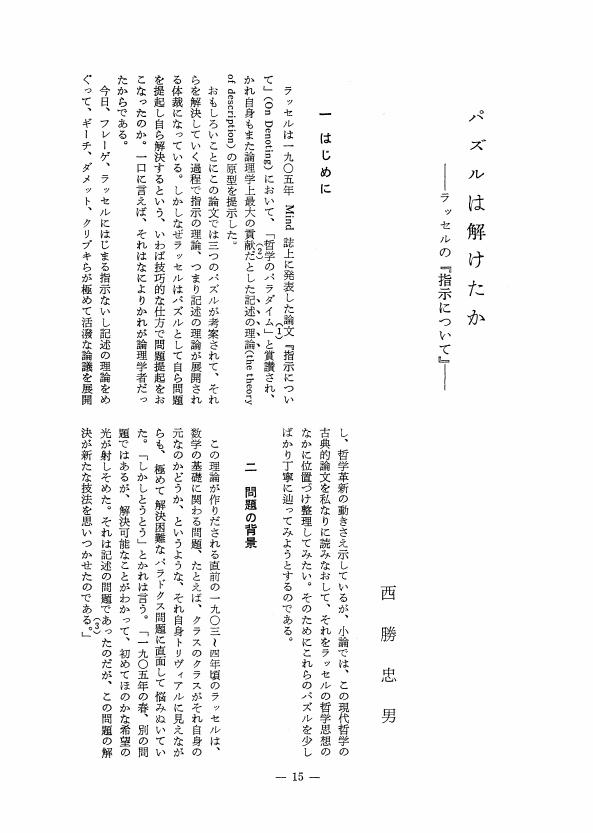1 0 0 0 OA ホッブズ機械論的自然像の形成過程 ―「トマス・ホワイトの『宇宙論』への批判」を通して―
- 著者
- 佐藤 正志
- 出版者
- 日本イギリス哲学会
- 雑誌
- イギリス哲学研究 (ISSN:03877450)
- 巻号頁・発行日
- vol.1, pp.5-14, 1978-04-01 (Released:2018-06-25)
1 0 0 0 OA パズルは解けたか ―ラッセルの『指示について』―
- 著者
- 西勝 忠男
- 出版者
- 日本イギリス哲学会
- 雑誌
- イギリス哲学研究 (ISSN:03877450)
- 巻号頁・発行日
- vol.1, pp.15-24, 1978-04-01 (Released:2018-06-25)
- 著者
- 山下 太郎
- 出版者
- 日本イギリス哲学会
- 雑誌
- イギリス哲学研究 (ISSN:03877450)
- 巻号頁・発行日
- vol.1, pp.25-34, 1978-04-01 (Released:2018-06-25)
1 0 0 0 OA F・ベイコン思想に於ける善について
- 著者
- 若林 明
- 出版者
- 日本イギリス哲学会
- 雑誌
- イギリス哲学研究 (ISSN:03877450)
- 巻号頁・発行日
- vol.1, pp.35-44, 1978-04-01 (Released:2018-06-25)
1 0 0 0 過去概念の源泉としての再認:―ウィトゲンシュタインの時間論―
- 著者
- 加地 大介
- 出版者
- 日本イギリス哲学会
- 雑誌
- イギリス哲学研究 (ISSN:03877450)
- 巻号頁・発行日
- vol.16, pp.17-28, 1993
1 0 0 0 書評
1 0 0 0 ジェイムズ6世の政治思想:―思想的コンテクストと特徴―
- 著者
- 小林 麻衣子
- 出版者
- 日本イギリス哲学会
- 雑誌
- イギリス哲学研究 (ISSN:03877450)
- 巻号頁・発行日
- vol.25, pp.23-38, 2002
<p>The political thought of James VI has always been associated witn the divine right of kingship. However, the theory of divine kingship is merely one feature of his thought. James primarily developed his ideas under the influence of political realism that he encounterea in his youth. He then incorporated various elements of religious reformers' views and Renaissance humanism into his thought for the purpose of constructing strong kingship, which could not be threatened by any other entity. <br>In this paper, I examine the historical context that influenced the development of James' thought and the characteristics of his thought—the obedience theory, Renaissance humanism, and political realism.</p>
- 著者
- 藤田 昇吾
- 出版者
- 日本イギリス哲学会
- 雑誌
- イギリス哲学研究 (ISSN:03877450)
- 巻号頁・発行日
- vol.10, pp.16-28, 1987
- 著者
- 石原 正博
- 出版者
- 日本イギリス哲学会
- 雑誌
- イギリス哲学研究 (ISSN:03877450)
- 巻号頁・発行日
- vol.22, pp.69-81, 1999
<p>Harriet Taylor and J. S. Mill, in the late 1840's and early 1850's, just before and after their marriage, wrote a series of articles on injustice and cruelty, revealing their growing concern over the effects of male violence and authority sanctioned by law. Their intention was to drive legislators and judges to regard violence as a serious crime deserving severe punishment. My analytical approaches are based upon thoughts in their "joint productions"; sometimes Mill comments, "Very little of this article was mine". This paper aims to shed light on Harriet Taylor's ideas and the formative process of Mill's thoughts.</p>
1 0 0 0 福澤諭吉と宗教
- 著者
- 小泉 仰
- 出版者
- 日本イギリス哲学会
- 雑誌
- イギリス哲学研究 (ISSN:03877450)
- 巻号頁・発行日
- vol.34, pp.5-18, 2011
- 著者
- 角田 俊男
- 出版者
- 日本イギリス哲学会
- 雑誌
- イギリス哲学研究 (ISSN:03877450)
- 巻号頁・発行日
- no.35, pp.179-181, 2012
1 0 0 0 会長講演 欲求充足と幸福 : 虚しさと僥倖をめぐって
- 著者
- 成田 和信
- 出版者
- 日本イギリス哲学会
- 雑誌
- イギリス哲学研究 = Studies in British Philosophy :the journal of the Japanese Society for British Philosophy (ISSN:03877450)
- 巻号頁・発行日
- no.41, pp.5-16, 2018
1 0 0 0 研究例会報告要旨
1 0 0 0 所有の労働理論に対するカントの批判
- 著者
- 樽井 正義
- 出版者
- 日本イギリス哲学会
- 雑誌
- イギリス哲学研究 (ISSN:03877450)
- 巻号頁・発行日
- vol.5, pp.25-33, 2018-06-25
1 0 0 0 学界展望 ヒューム研究の現在
- 著者
- 古田 拓也
- 出版者
- 日本イギリス哲学会
- 雑誌
- イギリス哲学研究 (ISSN:03877450)
- 巻号頁・発行日
- no.37, pp.77-91, 2014
- 著者
- 古田 拓也
- 出版者
- 日本イギリス哲学会
- 雑誌
- イギリス哲学研究 (ISSN:03877450)
- 巻号頁・発行日
- vol.37, pp.77-91, 2014
<p>The aim of this paper is to present John Lockeʼs arguments in the <i>Two Treatises of Government</i> as a comprehensive response to Robert Filmerʼs vehement criticism of the contract theory. Filmer argues that contract theory neither works in theory nor in practice, and so is, as such, a theory of anarchy. Partly accepting these criticisms, Locke constructs a contract theory such that Filmerʼs attacks lose their theoretical sting, that is, an individualistic contract theory which rejects the stigmatization of anarchy. However, Lockeʼs reconstruction is based on the theological foundations which we cannot reasonably share today. Acknowledgement of this fact, in turn, enables us to appreciate the contemporary significance of both Locke <i>and</i> Filmer.</p>
1 0 0 0 ヒュームにおける自然法則と偶然的規則性の問題
- 著者
- 萬屋 博喜
- 出版者
- 日本イギリス哲学会
- 雑誌
- イギリス哲学研究 (ISSN:03877450)
- 巻号頁・発行日
- no.34, pp.49-64, 2011
1 0 0 0 シドナムとロック--記述的方法論の継承
- 著者
- 青木 滋之
- 出版者
- 日本イギリス哲学会
- 雑誌
- イギリス哲学研究 (ISSN:03877450)
- 巻号頁・発行日
- no.31, pp.13-33, 2008



